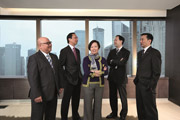
| Corporate Responsibility Report 2012 |
| Our Report | |
| Chief Executive's Message | |
| Our Values | |
| Our Business | |
| Our Commitment Performance |
|
| Our Commitment Corporate Governance |
|
| Our Commitment Customers |
|
| Our Commitment Suppliers |
|
| Our Commitment Staff |
|
| Our Commitment Environment |
|
| Our Commitment Community |
|
| Additional information | |
Our credibility as the leading domestic bank in Hong Kong relies on our operational integrity and the transparency of the information we provide to stakeholders. We uphold high standards of corporate governance, complying with both the letter and spirit of all relevant laws, regulations, guidelines and codes of conduct. If local compliance requirements are set at a lower standard than those established by our policies, our higher standards will apply where these do not contravene or conflict with local law. We give our full cooperation to and work with local regulators in the development and enhancement of industry standards.
Our employees are on the frontlines in ensuring we always operate ethically, honestly and with full accountability, and in maintaining the strength of our corporate reputation. We provide training covering issues including banking regulations and codes of practice; illegal activities such as bribery and corruption, money laundering and insider trading; and on equal opportunities and data privacy. We have comprehensive systems to ensure the appropriate use and protection of all data, particularly in relation to customer information.
We use robust ‘know your customer’ and assessment processes that are designed to minimise our exposure to the risk of establishing relationships with individuals or organisations engaged in activities such as money laundering, terrorism or irresponsible environmental practices and/or that involve forced or child labour or violate indigenous or other human rights.
We have also implemented financing policies that reward customers committed to supporting positive environmental change.
Our commitment to high standards of corporate governance includes following the module on Corporate Governance of Locally Incorporated Authorised Institutions issued by the Hong Kong Monetary Authority and full compliance with all the provisions and most of the recommended best practices as set out in the Corporate Governance Code contained in the Rules Governing the Listing of Securities on The Stock Exchange of Hong Kong Limited. We regularly review and, if appropriate, enhance our corporate governance framework to ensure it is in line with international and local best practices.Note B
Board of DirectorsAs at 20 March 2013, our Board consisted of 16 Directors – two Executive Directors and 14 Non-executive Directors. The Board includes five female Directors (one Executive Directors and four Non-executive Directors) – giving us the second-highest proportion of female Board representation (31.3%) among the constituent companies of the Hang Seng Index and the highest such representation among Hong Kong-headquartered companies. There is a strong independent element on the Board, with nine Independent Non-executive Directors, to ensure the objectivity of the Board’s decision-making process as well as the thoroughness and impartiality of the Board’s oversight of Hang Seng’s senior management.
The Board has adopted a Board Diversity policy that, among other things, establishes that the Directors serve in an environment in which bias, discrimination and harassment in any form will not be tolerated.
Members of the Board, who come from a variety of different backgrounds, have a diverse range of business, banking and professional expertise. The Board possesses, both as individual Directors and collectively, appropriate experience, competencies and personal qualities to discharge its responsibilities adequately and effectively. In addition, the Board collectively has adequate knowledge and expertise relevant to each of the material business activities that the Bank pursues and the associated risks in order to ensure effective governance and oversight.
Board Committees
The Board has set up five committees: the Executive Committee, the Audit Committee, the Risk Committee, the Remuneration Committee and the Nomination Committee. Each committee has specific written terms of reference that set out its authorities and responsibilities.
Hang Seng's Board of Directors
16 Directors
- - 2 Executive Directors
- - 14 Non-executive Directors (9 Independent)
- 9 meetings in 2012Note C

Executive Committee
7 Members
Responsible for the management and day-to-day running of the Bank
- Vice-Chairman and Chief Executive
- Executive Director and Head of Global Banking and Markets
- Head of Retail Banking and Wealth Management
- Chief Financial Officer
- Chief Operating Officer
- Head of Corporate and Commercial Banking
- Chief Risk Officer
- 13 meetings in 2012Note D
Audit Committee
3 Members
Responsible for financial reporting, the nature and scope of audit reviews, the effectiveness of systems of internal control and compliance relating to financial reporting
- 3 Independent Non-executive Directors
- 5 meetings in 2012
Remuneration Committee
3 Members
Responsible for making recommendations to the Board on the policy and structure for all remuneration and fees of Directors, senior management and key personnel
- 3 Independent Non-executive Directors
- 2 meetings in 2012
Risk CommitteeNote E
3 Members
Responsible for high-level risk-related matters, risk appetite and tolerance, risks associated with proposed strategic acquisitions or disposals, risk management reports from the Management, the effectiveness of the Bank’s risk management framework and the systems of internal control and compliance (other than internal financial control systems)
- 3 Independent Non-executive Directors
Nomination CommitteeNote F
5 Members
Responsible for leading the process for Board appointments, and identifying and nominating for the approval of the Board, candidates for appointment to the Board
- 3 Independent Non-executive Directors
- 1 Executive Director
- 1 Non-executive Director
- 1 meeting in 2012
Hang Seng Bank (China) Limited – Corporate Governance StructureNote
Hang Seng Bank (China) Limited (Hang Seng China) was established in 2007 and complies with all rules and regulations governing the set up and operation of mainland China subsidiaries of foreign banks.
Board of Directors
As at 31 December 2012, there were eight Directors on the Hang Seng China Board, including one Executive Director, who is also Chief Executive and Vice-Chairman of Hang Seng China, and seven Non-executive Directors. Among the seven Non-executive Directors, four are Independent Non-executive Directors.
Board Meetings
The Board held four meetings in 2012.
Board Reports to
Sole shareholder, Hang Seng Bank Limited.
Board Committees
The Board has established four committees: the Executive Committee, the Risk Committee, the Audit Committee and the Connected Transactions Control Committee. Each committee has specific written terms of reference that clearly regulate its authority, duties and meeting rules.
Hang Seng China's Board of Directors
8 Directors
- - 1 Executive Director
- - 7 Non-executive Directors (4 Independent)
- 4 meetings in 2012

Executive Committee
11 Members
Responsible for the management and day-to-day running of Hang Seng China
- Chief Executive
- Shareholder-nominated representative
- 5 Deputy Chief Executives
- Chief Risk Officer
- Chief Financial Officer
- Chief Operating Officer
- Head of Treasury Department
- 12 meetings in 2012
Audit
Committee
3 Members
Responsible for financial reporting, internal audit, the effectiveness of systems of financial-related internal control and compliance oversight
- 3 Independent Non-executive Directors
- 4 meetings in 2012
Risk
Committee
3 Members
Responsible for high-level risk issues and risk management oversight
- 3 Independent Non-executive Directors
- 4 meetings in 2012
Connected Transactions Control Committee
4 Members
Responsible for the implementation of the connected transactions policy, inspection of connected transactions, and the approval of substantial connected transactions
- 2 Independent Non-executive Directors
- 1 Non-executive Director
- Chief Risk Officer
- 2 meetings in 2012
Supervisor
Hang Seng China has one supervisor, nominated by and reporting to the shareholder, who is required to attend all Board meetings. Hang Seng China’s supervisor attended all Board meetings in 2012.
Risk Management
The effectiveness of our risk management policies and strategies is a key factor in our success.
The internal audit function provides independent, objective assurance to senior management and the Audit Committee with respect to risk management and the governance and controls framework (including financial controls), to add value and improve operations through process and control enhancement recommendations. It accomplishes its objectives by bringing a systematic, disciplined approach to the evaluation and improvement of the effectiveness of risk management, control and governance processes, helping senior management to achieve their objectives within their stated risk appetite and in accordance with our ethics, values and standards.
Reporting directly to the Executive Committee, our Risk Management Committee is responsible for, among other things, our high-level risk-related matters, risk appetite and tolerance, risks associated with proposed strategic acquisitions or disposals, risk management reports from senior management and the effectiveness of our risk management framework and the systems of internal control and compliance. The Board of Directors approves risk management policies and major control limits. More details on our management of risk can be found in the 'Corporate Governance and Other Information', 'Financial Review' and '2012 Financial Statements' sections of our 2012 Annual Report.
New product development and sign-off procedures as stipulated in our Group Service Manual are in place to ensure that the design of all new products and services are reviewed and tailored to suit customers’ needs before launch. All new products and material product variations must be approved by the Product Oversight Committee (POC) as a sub-committee of the Risk Management Committee (RMC). The approved products will be noted in the subsequent RMC meeting.
We maintain documented Business Continuity Plans for critical operations and significant risks, including arrangements for back-up site operations and a clearing and settlement services contingency plan to ensure that critical market functions remain operational.
For environmental risk-related matters, we follow the sustainability risk requirements of the HSBC Group. Environmental risk largely includes the risks of degrading the natural environment through accidental or deliberate actions.
Our primary risk in this regard is the indirect impact of corporate and commercial lending decisions. We support international responsible financing principles and sector-specific guidelines to help manage these environment-related sustainability risks (see ‘Responsible Banking Services’ section below). We also require that our credit assessment executives conduct a sustainability risk assessment of all credit applications – both new applications and annual reviews – by our business customers.
Compliance
Our key values include a solid commitment to quality, professionalism and integrity throughout our business. We have structures in place to ensure that our staff comply with both the letter and spirit of all relevant laws, codes, rules, regulations and guidelines and codes of conduct. In any jurisdiction where local compliance requirements are set at a lower standard than those established by our Group policies, our higher standards will apply where these do not contravene or conflict with local law.
Staff Code of Conduct
To ensure we operate according to the highest standards of ethical conduct and professional competence, all members of staff are required to strictly follow the Code of Conduct contained in our Staff Handbook. With reference to the applicable regulatory guidelines and other industry best practices, the Code sets out ethical standards and values to which all our staff are required to adhere and covers various legal, regulatory and ethical issues. Topics including – but not limited to – the prevention of bribery, use of information, insider dealing and personal investment dealing, personal benefits, outside directorships/employment and equal opportunities policy are covered in the Code.
Staff Awareness
A key factor in ensuring legal and regulatory compliance, as well as guarding against illegal activities such as fraud and money laundering, is to maintain a high level of staff awareness through training. All employees must complete an anti-bribery and corruption e-learning programme to ensure that they are familiar with the relevant laws and regulatory requirements. Other compliance training programmes include those covering equal opportunities, data privacy, occupational health and safety, anti-money laundering and code of banking practice. All management employees have received the training. Line managers with members of staff on leave during a pre-arranged training session are responsible for reminding such staff to complete the training when they resume duty.
Insider Information and Conflicts of Interest
We have procedures in place to keep information confidential and manage actual or potential conflicts of interest. Stringent internal structures have been designed to prevent the misuse of insider information and avoid conflicts of interest. Staff working in sensitive or high-risk areas are required to undergo additional job-specific training.
Whistle-blowing
We encourage the reporting of suspected internal business irregularities and provide clear channels specifically for this purpose.
Anti-money Laundering
We comply with high standards of anti-money laundering, counter-terrorist financing and sanctions practice. We have stringent internal guidelines and procedure manuals as well as staff training to ensure proper internal controls and enable suspicious transactions to be identified and reported.
Price-sensitive Information
We have established a robust framework for the disclosure of price-sensitive information in compliance with the Listing Rules and other regulatory requirements. The framework sets out the procedures and internal controls for the handling and dissemination of price-sensitive information in a timely manner to help shareholders, customers, staff and other stakeholders understand the latest position of the Bank and its subsidiaries. The framework and its effectiveness are subject to review on a regular basis according to established procedures.
Data Privacy
Ensuring the privacy of our customers’ personal information and other data is among our most important responsibilities in maintaining our reputation for good governance and in establishing the trust that underpins lasting business relationships. We comply with all data privacy regulations and have formulated a set of Privacy Principles to guide staff in protecting customer information. Specific processes for the handling and protection of customer data are set out in the relevant internal procedural manual.
Data privacy matters are overseen by our Chief Compliance Officer and Data Protection Officer. Data Controlling Officers have been appointed at a functional or business unit level to promote data protection and disseminate information on related new guidelines or developments. We also have a Personal Data Protection Information Centre on our intranet to further ensure staff awareness of the latest internal and external requirements.
Equal Opportunities, Anti-discrimination and Human Rights
We fully comply with Hong Kong labour law and our internal code of conduct. We also take steps to assess potential new client and supplier relationships with the aim of minimising the risk of indirectly facilitating the violation of any individual’s labour or human rights.
We provide a wide range of staff training on equal opportunities, diversity and human rights-related issues that are relevant to our operations and to creating a positive working environment. More details on our equal opportunities policies and training can be found in the ‘Our Commitment: Staff’ section of this Report.
Responsible Banking Services
Lending and Investment Policies
Our financing decisions reflect our business principles, risk assessment processes and the needs of our customers.
Evaluation of environmental-related impacts is part of our credit evaluation process for credit approval from time to time and any deviation from our established policies must be fully justified and will be considered as highly exceptional. Normally, a target date to comply with our environmental-related standards will be established as part of the credit approval agreement in such cases. If the customer fails to implement demonstrable actions to achieve such compliance, we will take steps to exit the credit arrangement.
We abide by the Equator Principles, a set of voluntary guidelines for the assessment and management of environmental and social risks in project financing. We also have specific guidelines on lending to businesses operating in environmentally sensitive sectors such as chemicals, energy, forestry, freshwater infrastructure, and mining and minerals (see box: Responsible Financing). We also have a defence equipment policy which sets out our approach to companies involved with weapons.
Facilitating Positive Change
The Hang Seng Green Financing Scheme provides funding for Hong Kong-owned factories in the Pearl River Delta (PRD) region to acquire green equipment that will enhance energy efficiency and reduce pollution.
For corporate customers that have had their project assessed and endorsed by the Hong Kong Productivity Council (HKPC) with respect to its impact on energy efficiency and pollution reduction, we offer up to 100% financing on an equipment financing loan, and other privileges such as an annual fee waiver on commercial credit cards, and discounts on premiums for general insurance products. As an additional gesture of support for improved environmental protection, we donate HK$1 for every HK$1,000 loan amount borrowed under the Scheme to a Green Fund administrated by the HKPC for environmental protection activities, with benefiting organisations including Friends of the Earth (HK), Green Power and WWF HK.
Responsible Financing
Our belief in promoting sustainable business practices means that we carefully assess potential environmental and social risks when deciding to make a loan or investment.
Specific guidelines in this regard include:
Forest Land and Forestry Products Sector
Outlines how we will work with our customers to promote sustainable forestry practices.
Freshwater Infrastructure Sector
Aims to ensure the consistency of our involvement in freshwater infrastructure projects, particularly from the standpoint of sustainable development.
Chemical Industry Sector
Highlights the international, regional and national standards we conform to in lending to the chemical industry and outlines how we will work with our customers towards more sustainable chemical manufacture.
Energy Sector
Establishes sustainability standards for our involvement in the energy sector and for providing financial services to energy sector projects.
Mining and Metals Sector
Sets out the principles and standards that govern our involvement in all areas of the mining and metals sector, including exploration, extraction, mine closure and reclamation, and primary processing.
Defence Equipment Sector
Establishes our position with regard to companies involved in the manufacture and sale of weapons.
We have a number of training programmes that cover our environmental and social policies, including as part of our New Joiners Programme, to improve staff competency in implementing these policies and procedures as applied to our various business lines.
Top
| |
||



